教师版倒装(含答案)
倒 装 句(含讲解和题目)
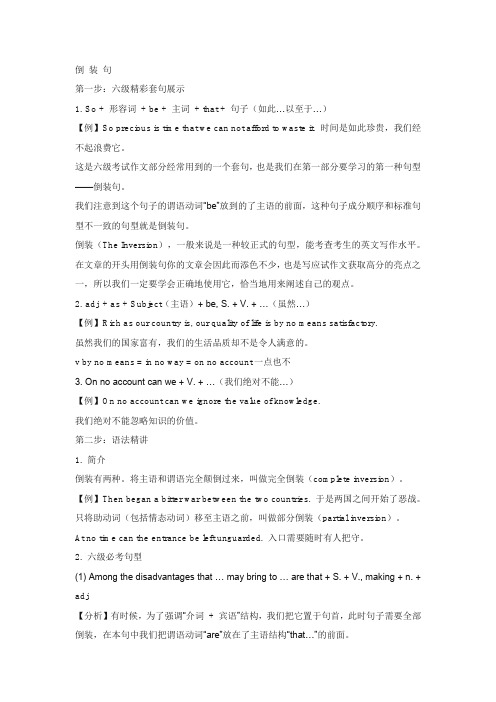
倒装句第一步:六级精彩套句展示1. So + 形容词+ be + 主词+ that + 句子(如此…以至于…)【例】So precious is time that we can not afford to waste it. 时间是如此珍贵,我们经不起浪费它。
这是六级考试作文部分经常用到的一个套句,也是我们在第一部分要学习的第一种句型——倒装句。
我们注意到这个句子的谓语动词“be”放到的了主语的前面,这种句子成分顺序和标准句型不一致的句型就是倒装句。
倒装(The Inversion),一般来说是一种较正式的句型,能考查考生的英文写作水平。
在文章的开头用倒装句你的文章会因此而添色不少,也是写应试作文获取高分的亮点之一,所以我们一定要学会正确地使用它,恰当地用来阐述自己的观点。
2. adj. + as + Subject(主语)+ be, S. + V. + …(虽然…)【例】Rich as our country is, our quality of life is by no means satisfactory.虽然我们的国家富有,我们的生活品质却不是令人满意的。
v by no means = in no way = on no account一点也不3. On no account can we + V. + …(我们绝对不能…)【例】On no account can we ignore the value of knowledge.我们绝对不能忽略知识的价值。
第二步:语法精讲1. 简介倒装有两种。
将主语和谓语完全颠倒过来,叫做完全倒装(complete inversion)。
【例】Then began a bitter war between the two countries. 于是两国之间开始了恶战。
只将助动词(包括情态动词)移至主语之前,叫做部分倒装(partial inversion)。
【英语语法】倒装句专项练习(含答案解析)
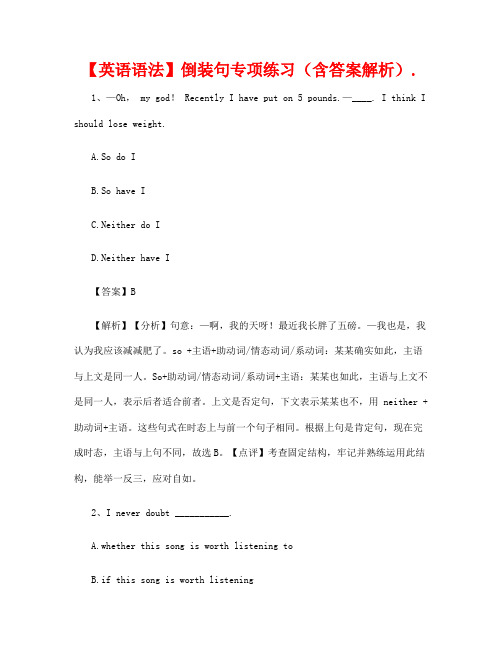
【英语语法】倒装句专项练习(含答案解析).1、—Oh, my god! Recently I have put on 5 pounds.—____. I think I should lose weight.A.So do IB.So have IC.Neither do ID.Neither have I【答案】B【解析】【分析】句意:—啊,我的天呀!最近我长胖了五磅。
—我也是,我认为我应该减减肥了。
so +主语+助动词/情态动词/系动词:某某确实如此,主语与上文是同一人。
So+助动词/情态动词/系动词+主语:某某也如此,主语与上文不是同一人,表示后者适合前者。
上文是否定句,下文表示某某也不,用 neither +助动词+主语。
这些句式在时态上与前一个句子相同。
根据上句是肯定句,现在完成时态,主语与上句不同,故选B。
【点评】考查固定结构,牢记并熟练运用此结构,能举一反三,应对自如。
2、I never doubt ___________.A.whether this song is worth listening toB.if this song is worth listeningC.that this song is worth listeningD.that this song is worth listening to【答案】D【解析】【分析】句意:我从来没有怀疑这首歌值得去听。
根据句子结构分析,本句是宾语从句,根据主句I never doubt,可知从句是陈述句,故排除A 和B,又因为listen to为固定搭配,故选D。
【点评】考查宾语从句。
注意识记宾语从句的用法。
3、— I have changed my job.— ___________A.So do I.B.So have I.C.So I do.D.So I have.【答案】B【解析】【分析】句意: —我换了工作。
—我也是。
(完整版)倒装句全面讲解和练习(答案)

初中英语倒装句(一)倒装句的意义1、适应一定的语法结构的需要,主要是指疑问句句型结构的需要。
E.g. Was the People 's Liberation Army founded in 1927?2、为了强调某一部分,而把这部分放到句首,构成倒装。
e.g. Never have I been late for school this term.(二)倒装的使用情况一、部分倒装:就是把谓语中的be 动词、助动词或情态动词置于主语前面。
常见于下列几种情况:(一). only 所修饰的副词,介词短语或状语从句放在句首时,要用:only+ 状语+ be /助动词/情态动词+主语及其他例如:Only when he told me the news did I know what had happened.注意:only 修饰主语时,不需要倒装。
例如:Among all the people, only you know the truth. 小试牛刀:Only in this way __________ to make improvement in the operating system.A.you can hopeB. you did hopeC. can you hopeD. did you hope(二).含有否定意义的副词或连词放在句首时。
如:never, little, seldom, not, not only, not until, no sooner (hardly ( ⋯when), rarely, scarcely, in no way 等。
例如:We seldom get up at four in the morning.= Seldom do we get up at four in the morning.Not a single word from him could express his feelings.(1)hardly ⋯when; scarcely ⋯when⋯; no sooner ⋯than可⋯以用正常语序had hardly done when ⋯did 或用倒装句式Hardly had + 主语+ done when⋯did 句式。
一、倒装句及答案
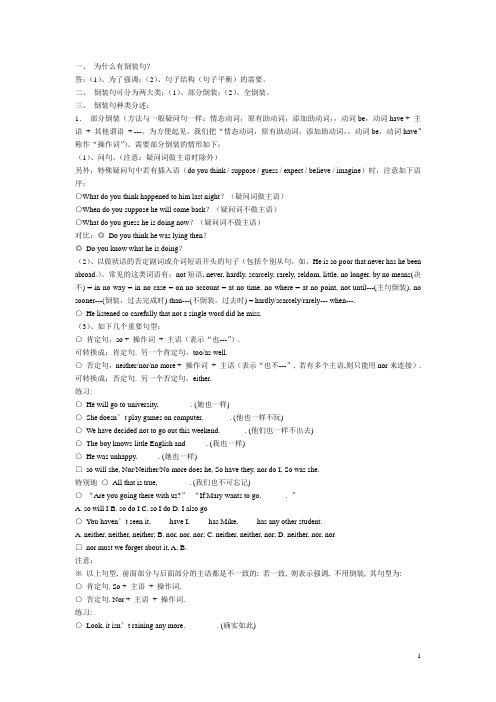
一、为什么有倒装句?答:(1)、为了强调;(2)、句子结构(句子平衡)的需要。
二、倒装句可分为两大类:(1)、部分倒装;(2)、全倒装。
三、倒装句种类分述:1.部分倒装(方法与一般疑问句一样:情态动词,原有助动词,添加助动词,,动词be,动词have + 主语+ 其他谓语+ ---。
为方便起见,我们把“情态动词,原有助动词,添加助动词,,动词be,动词have”称作“操作词”)。
需要部分倒装的情形如下:(1)、问句。
(注意:疑问词做主语时除外)另外,特殊疑问句中若有插入语(do you think / suppose / guess / expect / believe / imagine)时,注意如下语序:○What do you think happened to him last night?(疑问词做主语)○When do you suppose he will come back?(疑问词不做主语)○What do you guess he is doing now?(疑问词不做主语)对比:◎Do you think he was lying then?◎Do you know what he is doing?(2)、以做状语的否定副词或介词短语开头的句子(包括个别从句,如,He is so poor that never has he been abroad.)。
常见的这类词语有:not短语, never, hardly, scarcely, rarely, seldom, little, no longer, by no means(决不) = in no way = in no case = on no account = at no time, no where = at no point, not until---(主句倒装), no sooner---(倒装,过去完成时) than---(不倒装,过去时) = hardly/scarcely/rarely--- when---.○He listened so carefully that not a single word did he miss.(3)、如下几个重要句型:○肯定句,so + 操作词+ 主语(表示“也---”).可转换成:肯定句. 另一个肯定句,too/as well.○否定句,neither/nor/no more + 操作词+ 主语(表示“也不---”, 若有多个主语,则只能用nor来连接). 可转换成:否定句. 另一个否定句,either.练习:○He will go to university, ________. (她也一样)○She doesn’t play games on computer. ______ . (他也一样不玩)○We have decided not to go out this weekend. ______. (他们也一样不出去)○The boy knows little English and _____. (我也一样)○He was unhappy. _____. (她也一样)□so will she, Nor/Neither/No more does he, So have they, nor do I, So was she.特别地○All that is true, ________. (我们也不可忘记)○“Are you going there with us?”“If Mary wants to go, ______. ”A. so will IB. so do IC. so I doD. I also go○You haven’t seen it, ____ have I, ____ has Mike, ____ has any other student.A. neither, neither, neither;B. nor, nor, nor;C. neither, neither, nor;D. neither, nor, nor□nor must we forget about it, A, B.注意:※以上句型, 前面部分与后面部分的主语都是不一致的; 若一致, 则表示强调, 不用倒装, 其句型为:○肯定句. So + 主语+ 操作词.○否定句. Nor + 主语+ 操作词.练习:○Look, it isn’t raining any more. ________. (确实如此)○They work hard. ________. (确实如此)○There is a good film on at the cinema. _______. (确实如此)○There was nothing for Della to do but sell her hair. _______. (确实如此)□Nor it is, So they do, So there is, So Della did.※若前面部分(有时可能有两个或两个以上的句子),或主语不一致,或谓语不一致,或肯定和否定不一致; 或前后主语性质不一致; 则有“通用”句型:◎前面部分. So it is / was / will be with ---.◎前面部分. It is / was / will be the same with ---.练习:○She is ready to help others and her stories are worth learning from. ______. (她的姐姐也一样) □It is the same with/So it is with her sister.○John isn’t a good student and doesn’t do well in his subjects. _______. (山姆也一样) □It is the same with/So it is with Sam.○His house is not large but fine and nice. ________. (小燕的房子也一样)○ A lot of fruit trees have been grown in their school. ______. (我们学校也一样)(4)、以“Only + 状语(包括状语从句)”开头的句子(或个别从句)。
考点09倒装句(核心考点精讲精练)-备战2024年高考英语一轮复习考点帮(上海专用)(教师版)

考点09 倒装句(核心考点精讲精练)近年真题考点分布【思维导图】【知识梳理】1.there be (lie, stand, live...)句型。
there be是谓语,其后的名词是主语。
There are different forms of energy.On the top of the mountain there stands an old temple.Once upon a time, there lived a poor fisherman.2、表时间、地点、方位的副词here, there, out, in, up, down, away, now, then等开头的句子中。
Here are my replies to your question.Then came the order to take off.Away ran the terrified boy.3、表地点或时间的介词短语作状语位于句首Beyond the bushes lay the fields.After the banquet came a display of fireworks.4、某些表语(介词短语/形容词短语/过去分词/进行时态中的现在分词)位于句首Near the church was an old ruined cottage.Present at the meeting were Professor White and many other guests.Buried in the sands was an ancient village.Leading to the park is a long and straight road.➢考点二:部分倒装1、Hardly/Barely/Scarcely...when...; No sooner...than...Hardly had he got into the bath than the phone rang.No sooner had she arrived in Rome than she was kidnapped.2、Not only...but also...Not only did he come up with a brilliant idea, but also he put it into pratice right away.3、Not until...Not until he was isolated from everyone did he realize how vital the interaction with others was.4、Only+副词/介词短语/状语从句...Only then did I realize the importance of math. (副词)Only by this means is it possible to explain it. (介词短语)Only when the war was over in 1918 was he able to get happily back to work. (从句)5、某些否定副词位于句首: never, not, no, little, still less, least of all, seldom, rarely, barely, hardly, scarcely, nowhere, no longerNot a word did I say to him.Never have I found him so happy.Little does he care about what I said.6、某些含no的介词短语位于句首:in no way,in no case,at no time,(在任何情况下都不)等Under no circumstances should we do anything that will benefit ourselves but harm the others.7、So/Such...that...So clearly does he speak English that he can always make himself understood.Such an aggressive child is he that he has made much achievements.8、状语从句中as/thoughExhausted as/ though she was, she wasn't able to sleep.Child as he is, he knows much about the world.Carefully as he did his homework, he still made many mistakes.Fail as he did, he didn’t give up.9、so/nor/neither开头的句子,也可写成it is the same with...或者so it is with...—He has been to Canada.—So have I. 我也是。
倒装句及50道练习题(含答案)
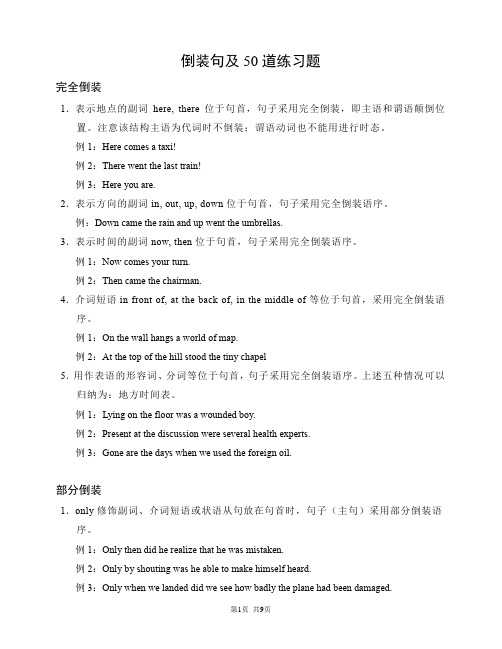
倒装句及50道练习题完全倒装1.表示地点的副词here, there位于句首,句子采用完全倒装,即主语和谓语颠倒位置。
注意该结构主语为代词时不倒装;谓语动词也不能用进行时态。
例1:Here comes a taxi!例2:There went the last train!例3:Here you are.2.表示方向的副词in, out, up, down位于句首,句子采用完全倒装语序。
例:Down came the rain and up went the umbrellas.3.表示时间的副词now, then位于句首,句子采用完全倒装语序。
例1:Now comes your turn.例2:Then came the chairman.4.介词短语in front of, at the back of, in the middle of等位于句首,采用完全倒装语序。
例1:On the wall hangs a world of map.例2:At the top of the hill stood the tiny chapel5.用作表语的形容词、分词等位于句首,句子采用完全倒装语序。
上述五种情况可以归纳为:地方时间表。
例1:Lying on the floor was a wounded boy.例2:Present at the discussion were several health experts.例3:Gone are the days when we used the foreign oil.部分倒装1.only修饰副词、介词短语或状语从句放在句首时,句子(主句)采用部分倒装语序。
例1:Only then did he realize that he was mistaken.例2:Only by shouting was he able to make himself heard.例3:Only when we landed did we see how badly the plane had been damaged.2.so/such….that…句型位于句首时,主句部分采用倒装语序。
(完整版)倒装句精讲及练习(含答案)

倒装句的用法英语倒装句分为两种:1、整个谓语在前的句子,叫完全倒装。
Here comes the car.2、部分谓语(情态动词、助动词、连系动词)在前,谓语的主体部分仍在主语之后的句子,叫部分倒装句。
Only then did he realize that he was wrong.必须弄清的两点:①若有主从句,哪句倒装。
②部分倒装还是完全倒装。
一、表示方位和时间的副词位于句首时(now ,then here ,there,out ,in ,up,down ,away ,back,off,on ), 句子全部倒装。
注:主语是代词时,不倒装。
(如 5,6)1.Here comes the bus .2.There goes the bell .3.Away went the students .4.Now comes the chance .Out rushed the children. he rushed.There comes the bus. 注意: 1.不能用进行时;he comes.2. 主语为人称代词时不倒装。
二、以介词短语表示的状语,提前位于句首时,全部倒装。
1.In a lecture hall of a university in England sits a professor .2.In front of our school stands a tower .3.By either side of the river grow a lot of apple trees .4.At the top of the mountain stands a temple .5. Among the goods are Christmas trees,flowers and toys.三、表语位于句首时,倒装结构为“表语+连系动词 +主语”A:形容词 +连系动词 +主语例 1.Present at the meeting were Professor White,Professor Smith and many other guests. 例 2.过去分词 +连系动词 +主语Gone are the days when they could do what they liked to the Chinese people.四、将 so\neither \nor 放在开头 ,表示“ 也 (不 )”的意思时 ,部分倒装注: 表示“确实是这样”时 ,不倒装1.He went to the film last night.So did I .2.You must finish your work ,so must I .3.She is interested in the story ,so am I .4.He didn ’ t turn up .Neither did his brother .5.His mother told him not to go to the film .So he did.五、在 if 条件 :在 if 条件句中 ,通常可以省略条件句 ,必须含有系动词if , 而将从句倒装were,助动词had 和情态动词should1.Were he younger(=If he were younger ),he would learn skating .2.Should they forget (=If they should forget ) to bring a map with them ,they would get lost inthe woods .3.Had they realized (=If they had realized ) how important the task was ,they wouldn ’ t have refused to accept .4.Were I you ,I would help her .六、否定词或半否定词(never .little ,seldom ,not ,nowhere ,scarely ,few ,by no means ,at no time ) 位于句首 ,应部分倒装1.Never have I been there .2.Little did I know about it .3.Seldom did she come late to school .4.Not a single mistake did he make .5.By no means should you buy that kind of car .七、以 not until,no sooner than , hardly when ,not only but also 所引导的状语放在句首时 ,需要部分倒装1.Not until 10 ’clock will the library open .2.No sooner had I gone out than he came to see me .3.Hardly had the train arrived when I ran to meet my friend.4.Not only does she speak English but also she follows the British way of life .八、 only及其修饰的状语位于句首时,后面的句子部分倒装。
倒装(教师用)
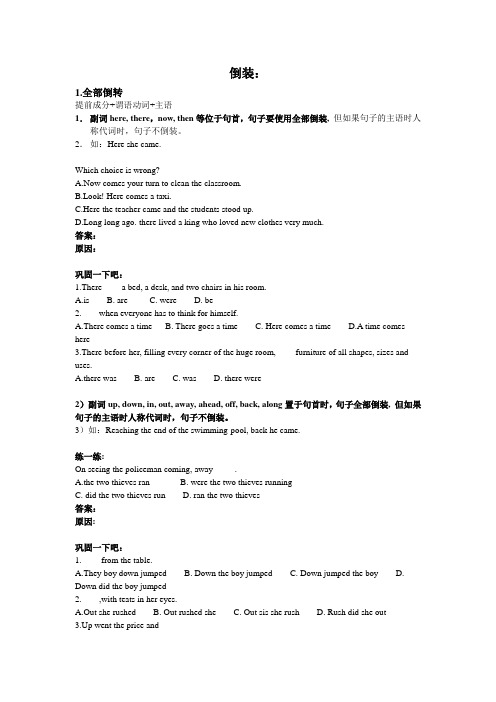
倒装:1.全部倒转提前成分+谓语动词+主语1.副词here, there,now, then等位于句首,句子要使用全部倒装,但如果句子的主语时人称代词时,句子不倒装。
2.如:Here she came.Which choice is wrong?A.Now comes your turn to clean the classroom.B.Look! Here comes a taxi.C.Here the teacher came and the students stood up.D.Long long ago. there lived a king who loved new clothes very much.答案:原因:巩固一下吧:1.There____ a bed, a desk, and two chairs in his room.A.isB. areC. wereD. be2.____when everyone has to think for himself.A.There comes a timeB. There goes a timeC. Here comes a timeD.A time comes here3.There before her, filling every corner of the huge room, ____furniture of all shapes, sizes and uses.A.there wasB. areC. wasD. there were2)副词up, down, in, out, away, ahead, off, back, along置于句首时,句子全部倒装,但如果句子的主语时人称代词时,句子不倒装。
3)如:Reaching the end of the swimming-pool, back he came.练一练:On seeing the policeman coming, away_____.A.the two thieves ranB. were the two thieves runningC. did the two thieves runD. ran the two thieves答案:原因:巩固一下吧:1.____ from the table.A.They boy down jumpedB. Down the boy jumpedC. Down jumped the boyD. Down did the boy jumped2.____,with teats in her eyes.A.Out she rushedB. Out rushed sheC. Out sis she rushD. Rush did she out3.Up went the price and____A.the living standardB. came down the living standardC. down came the living standardE.down the living standard cameF.4)表地点的介词短语置于句首时,句子全部倒装,句子的谓语动词多为be,lie,sit,stand,come,walk5)如:There on the mountain lives an old man, who I visited several years ago._____with a straw hat on his face.A. On the ground did an old man lieB. On the ground an old man layC. On the ground lay an old manD. On the ground there lay an old man答案:原因:4)分词结构位于句首时,起强调作用,此时句子全部倒装。
倒装句专题(含答案)
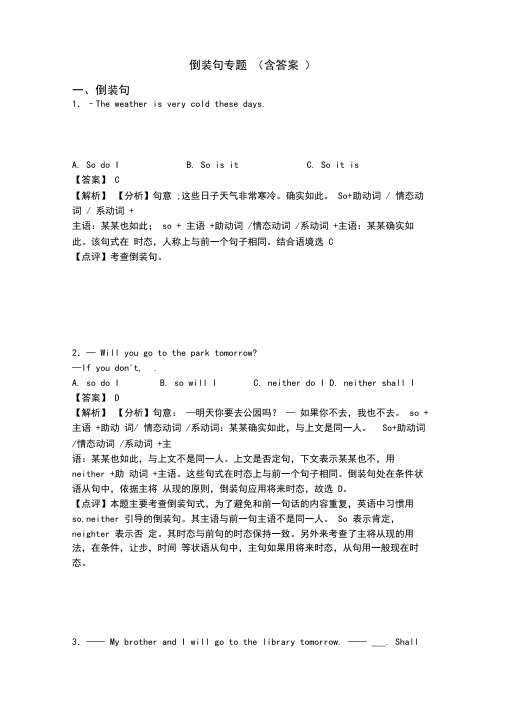
倒装句专题(含答案)一、倒装句1.–The weather is very cold these days.A. So do IB. So is itC. So it is【答案】 C【解析】【分析】句意 ;这些日子天气非常寒冷。
确实如此。
So+助动词 / 情态动词 / 系动词 +主语:某某也如此; so + 主语 +助动词 /情态动词 /系动词 +主语:某某确实如此。
该句式在时态,人称上与前一个句子相同。
结合语境选 C【点评】考查倒装句。
2.— Will you go to the park tomorrow?—If you don't, .A. so do IB. so will IC. neither do ID. neither shall I 【答案】 D【解析】【分析】句意:—明天你要去公园吗?—如果你不去,我也不去。
so +主语 +助动词/ 情态动词 /系动词:某某确实如此,与上文是同一人。
So+助动词/情态动词 /系动词 +主语:某某也如此,与上文不是同一人。
上文是否定句,下文表示某某也不,用neither +助动词 +主语。
这些句式在时态上与前一个句子相同。
倒装句处在条件状语从句中,依据主将从现的原则,倒装句应用将来时态,故选 D。
【点评】本题主要考查倒装句式,为了避免和前一句话的内容重复,英语中习惯用so,neither 引导的倒装句。
其主语与前一句主语不是同一人。
So 表示肯定,neighter 表示否定。
其时态与前句的时态保持一致。
另外来考查了主将从现的用法,在条件,让步,时间等状语从句中,主句如果用将来时态,从句用一般现在时态。
3.—— My brother and I will go to the library tomorrow. —— ___. Shallwe go together?A. So I doB. So do IC. So will ID. So I will 【答案】 C【解析】【分析】句意: ---明天我弟弟和我将要去图书馆。
英语语法专题倒装讲义和练习及答案

英语语法专题倒装讲义和练习及答案英语的大体语序是“主语+谓语”,若是将谓语的一部份或全数放在主语之前,这种语序叫倒装。
倒装既是一种语法手腕,也是一种修辞手腕,用于表示必然的句子结构或强调某一句子成份。
倒转句的考查主要从以下几个方面入手:1)含有否定意味的词置于句首,部份倒装;2)only+状语/状语从句置于句首,部份倒装;3)so/such…that句型中,so+形容词/副词提前,部份倒装;4)表示方位的副词或介词短语放在句首,要完全倒装。
一.倒装的原因A.语法倒装由于语法结构的需要,将谓语的全数或一部份移到主语之前。
1.一般疑问句当咱们把一个肯定句转变成疑问句时,常把肯定句中的助动词或情态动词放在句首。
这种助动词或情态动词包括:be,have,can,do,shall,will,may,must,dare,need,ought或used 等。
He will do it. ——Will he do it?他会做这件事吗?This is my mobile phone number. ——Is this your mobile phone number?这是你的电话号码吗?提示:若是肯定句中没有助动词或情态动词时,咱们可以在句首用do 的某种形式,以组成倒装语序。
Jack likes to eat fish. 杰克喜欢吃鱼。
——Does Jack like to eat fish 杰克喜欢吃鱼吗?2.特殊疑问句特殊疑问句的组成:特殊疑问词+ 一般疑问句What does he like to eat 他喜欢吃什么?When will they go to the Great Wall 他们何时去长城?Where did you go last night 昨晚你去哪里了?Who is not coming to dinner tonight 今晚谁不来用饭?3. 反意问句在反意问句中,用一般疑问句的形式,前后两分句的主语,人称要一致。
倒装句讲解及巩固提升练习(有答案)
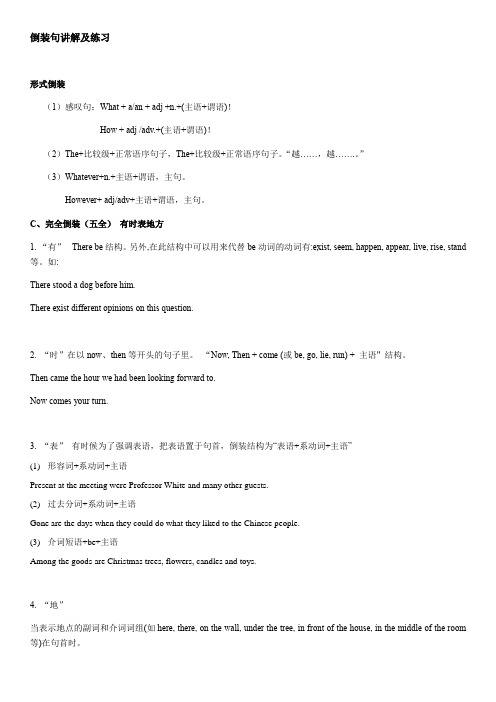
倒装句讲解及练习形式倒装(1)感叹句:What + a/an + adj +n.+(主语+谓语)!How + adj /adv.+(主语+谓语)!(2)The+比较级+正常语序句子,The+比较级+正常语序句子。
“越……,越…….。
”(3)Whatever+n.+主语+谓语,主句。
However+ adj/adv+主语+谓语,主句。
C、完全倒装(五全)有时表地方1. “有”There be结构。
另外,在此结构中可以用来代替be动词的动词有:exist, seem, happen, appear, live, rise, stand 等。
如:There stood a dog before him.There exist different opinions on this question.2. “时”在以now、then等开头的句子里。
“Now, Then + come (或be, go, lie, run) + 主语" 结构。
Then came the hour we had been looking forward to.Now comes your turn.3. “表”有时候为了强调表语,把表语置于句首,倒装结构为“表语+系动词+主语”(1)形容词+系动词+主语Present at the meeting were Professor White and many other guests.(2)过去分词+系动词+主语Gone are the days when they could do what they liked to the Chinese people.(3)介词短语+be+主语Among the goods are Christmas trees, flowers, candles and toys.4. “地”当表示地点的副词和介词词组(如here, there, on the wall, under the tree, in front of the house, in the middle of the room 等)在句首时。
【中考英语复习之语法过关】课时07 特殊句(1倒装句 2祈使句 3感叹句 4附加疑问句)(教师版)
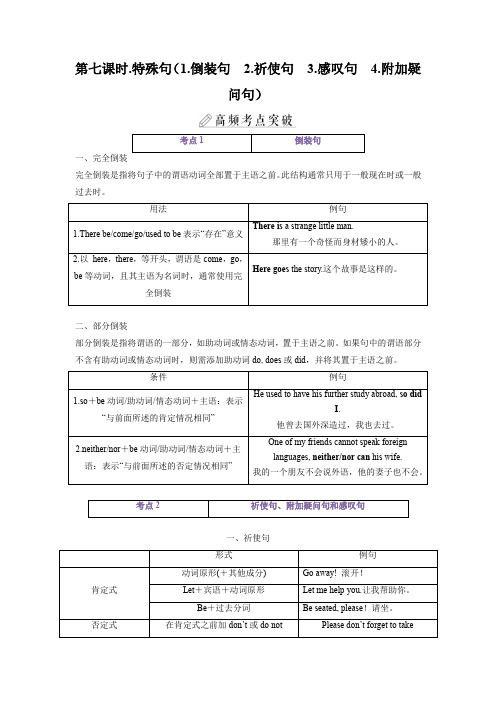
第七课时.特殊句(1.倒装句 2.祈使句 3.感叹句 4.附加疑问句)一、完全倒装完全倒装是指将句子中的谓语动词全部置于主语之前。
此结构通常只用于一般现在时或一般过去时。
部分倒装是指将谓语的一部分,如助动词或情态动词,置于主语之前。
如果句中的谓语部分不含有助动词或情态动词时,则需添加助动词do, does或did,并将其置于主语之前。
一、祈使句①It could be anything—gardening, cooking, music, sports—but whatever it is, make(make) sure it’s a relief from daily stress rather than another thing to worry about.①Will you please read it again more slowly?(改为祈使句)→Read__it again more slowly, please.①If you don’t listen to me, I’ll go.(改为同义句)→Listen__to__me,__or I’ll go.5.Simon, (推)hard when I tell you to.【答案】push句意:Simon,当我叫你推的时候,使劲推。
本题考查祈使句。
设空处用动词原形。
5.everyone with politeness even those who are very rude to you, not because they are nice, but because you are.A.TreatB.TreatingC.TreatedD.To treat【答案】A句意:礼貌地对待每一个人,即使他们对你很粗鲁,(这样做)不是因为他们好,而是因为你好。
本题考查祈使句,用动词原形。
故选A项。
二、附加疑问句附加疑问句由“陈述句+反意问句”构成,基本原则是“前否后肯,前肯后否”。
英语倒装句解题技巧及练习题(含答案)及解析

英语倒装句解题技巧及练习题(含答案)及解析一、倒装句1.-- He swam in the river this summer.-- ________A. So did he.B. So she did.C. So did she.【答案】 C【解析】【分析】“so+助动词(情态动词或连系动词)+另一主语”,此句型是主谓倒装结构,可以表示前面的情况也适用于后者,使用该句型需要注意以几个方面的问题:1.该句型只能用于肯定句,不能用于否定句:如果前句是否定句,则要用“neither /nor +助动词+主语”。
2.句型中的主语与上文中的主语是不同的两个主语3.句型中助动词,包括连系动词和情态动词的时态要和上句中谓语动词的时态相一致。
句意:这个夏天,他在这条河中游泳了。
她也游泳了。
结合语境可知前文情况也适用于后者,故用主谓倒装结构,选C。
【点评】这几个倒装句的区别比较难。
“so+助动词(情态动词或连系动词)+另一主语”,表示前面的情况也适用于后者。
So+主语+助动词(情态动词或连系动词)是对上文所说的情况加以肯定。
如果上文是否定形式则要将so换成neither。
2.一 I didn't watch the football match on TV yesterday.一 . I got home too late to watch it.A. So did IB. Neither did IC. So I didD. Neither I did【答案】 B【解析】【分析】neither/nor+助动词+主语,译为“某人(物)也不……”,如果上句是否定句,那么下句就是也不是这种情况;so+助动词+主语,意为“某人(物)也是……”如果上句是肯定句,那么下句就是也是这种情况。
用于这种结构的主语是不同的人,如果是上下的两句的主语是同一个人,则用半倒装结构,so+主语+助动词,表示“某人的确是这样”。
句意:—我没看昨天的聊天节目,—我也没看,我到家太晚而没有看。
倒装句专题(含答案)
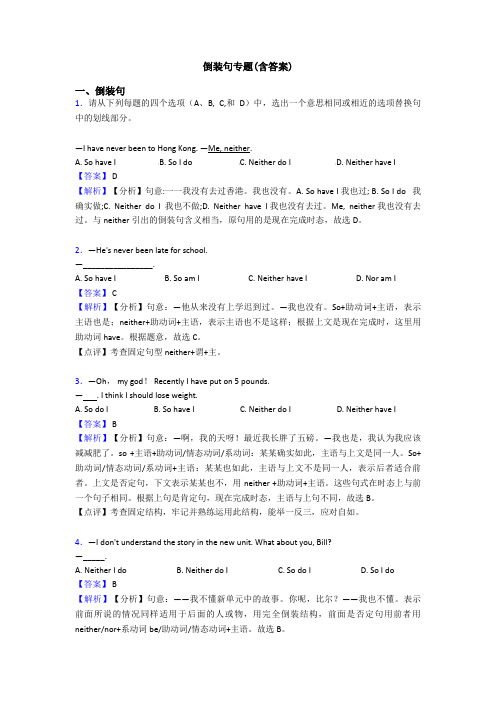
倒装句专题(含答案)一、倒装句1.请从下列每题的四个选项(A、B, C,和D)中,选出一个意思相同或相近的选项替换句中的划线部分。
—I have never been to Hong Kong. —Me, neither.A. So have IB. So I doC. Neither do ID. Neither have I【答案】 D【解析】【分析】句意:一一我没有去过香港。
我也没有。
A. So have I我也过; B. So I do 我确实做;C. Neither do I 我也不做;D. Neither have I我也没有去过。
Me, neither我也没有去过。
与neither引出的倒装句含义相当,原句用的是现在完成时态,故选D。
2.—He's never been late for school.—________________.A. So have IB. So am IC. Neither have ID. Nor am I【答案】 C【解析】【分析】句意:—他从来没有上学迟到过。
—我也没有。
So+助动词+主语,表示主语也是;neither+助动词+主语,表示主语也不是这样;根据上文是现在完成时,这里用助动词have。
根据题意,故选C。
【点评】考查固定句型neither+谓+主。
3.—Oh, my god! Recently I have put on 5 pounds.— . I think I should lose weight.A. So do IB. So have IC. Neither do ID. Neither have I【答案】 B【解析】【分析】句意:—啊,我的天呀!最近我长胖了五磅。
—我也是,我认为我应该减减肥了。
so +主语+助动词/情态动词/系动词:某某确实如此,主语与上文是同一人。
So+助动词/情态动词/系动词+主语:某某也如此,主语与上文不是同一人,表示后者适合前者。
倒装句练习题含答案

倒装句练习题含答案1.只有医生能救他的生命。
因为only强调的是主语,所以不需要倒装。
正确表达为:The doctor can save his life.2.“哦,天哪!我最近增加了5磅。
”“我也是,我认为我应该减肥。
”因为前一句是肯定句,所以使用So have I表示“我也是”。
正确表达为:“Oh。
my god。
Recently I have put on 5 pounds.” “So have I。
I think I should lose weight.”3.“我们在学校会议上不被允许带任何零食和饮料。
” “我们也是。
”因为前一句是否定句,所以使用XXX表示“我们也不被允许”。
正确表达为:“XXX.” “XXX.”也适用于另一个或物,其句型是neither+be(have,助动词或情态动词)+主语。
根据XXX希望有一天去美国,可知他也没去过,所以选D。
点评】考查so和XXX引导的倒装结构。
注意掌握其用法和句型。
同时注意区分so和neither的意义。
11.--Peter knows many people here.So do I.解析】XXX知道这里的很多人,我也是。
根据上下文,可以判断出前一句是一个陈述句,而答句则是一个肯定回答,使用so do I这个句式,表示我也一样。
注意到so后面跟的是助动词do,表示前一句的情况也适用于自己,而不是直接回答“是的”或“不是”。
因此,选项A正确。
10.—XXX?If I don't go。
XXX will he.解析】如果我不去,他也不去。
根据上下文,可以判断出前一句是一个问句,而答句则是一个条件句,使用neither will he这个句式,表示他也不会去。
注意到neither后面跟的是助动词will,表示前一句的情况也适用于他,而不是直接回答“不会”。
因此,选项D正确。
_________.A。
Yes。
I willB。
No。
I willC。
倒装句复习题(附答案)
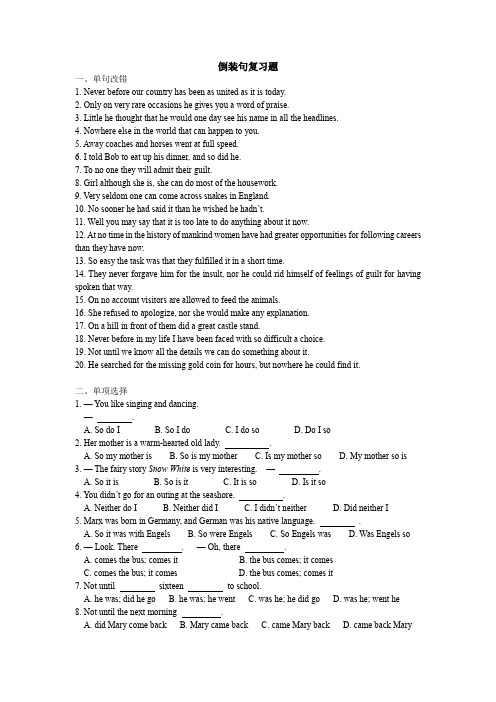
倒装句复习题一、单句改错1. Never before our country has been as united as it is today.2. Only on very rare occasions he gives you a word of praise.3. Little he thought that he would one day see his name in all the headlines.4. Nowhere else in the world that can happen to you.5. Away coaches and horses went at full speed.6. I told Bob to eat up his dinner, and so did he.7. To no one they will admit their guilt.8. Girl although she is, she can do most of the housework.9. Very seldom one can come across snakes in England.10. No sooner he had said it than he wished he hadn’t.11. Well you may say that it is too late to do anything about it now.12. At no time in the history of mankind women have had greater opportunities for following careers than they have now.13. So easy the task was that they fulfilled it in a short time.14. They never forgave him for the insult, nor he could rid himself of feelings of guilt for having spoken that way.15. On no account visitors are allowed to feed the animals.16. She refused to apologize, nor she would make any explanation.17. On a hill in front of them did a great castle stand.18. Never before in my life I have been faced with so difficult a choice.19. Not until we know all the details we can do something about it.20. He searched for the missing gold coin for hours, but nowhere he could find it.二、单项选择1. — You like singing and dancing.—.A. So do IB. So I doC. I do soD. Do I so2. Her mother is a warm-hearted old lady. .A. So my mother isB. So is my motherC. Is my mother soD. My mother so is3. — The fairy story Snow White is very interesting. —.A. So it isB. So is itC. It is soD. Is it so4. You didn’t go for an outing at the seashore. .A. Neither do IB. Neither did IC. I didn’t neitherD. Did neither I5. Marx was born in Germany, and German was his native language. .A. So it was with EngelsB. So were EngelsC. So Engels wasD. Was Engels so6. — Look. There . — Oh, there .A. comes the bus; comes itB. the bus comes; it comesC. comes the bus; it comesD. the bus comes; comes it7. Not until sixteen to school.A. he was; did he goB. he was; he wentC. was he; he did goD. was he; went he8. Not until the next morning .A. did Mary come backB. Mary came backC. came Mary backD. came back Mary9. Hardly when it began to rain.A. had he got homeB. he had got homeC. had got home heD. he home had got10. No sooner than he fell asleep.A. his head had touched the pillowB. had his head touched the pillowC. touched the pillow his head hadD. touched the pillow had his head11. Little .A. did I think of itB. I thought of itC. did think I of itD. thought of it I12. Seldom .A. Li Li her feelings showedB. did show Li Li her feelingsC. Li Li showed her feelingsD. does Li Li show her feelings13. Never before in her life such beautiful and precious jewelry.A. he sawB. did he seeC. has she seenD. she has seen14. Many a time the chess competition.A. had taken he part inB. he taken part in hadC. had he taken part inD. he had taken part in15. So busy that he has no time to spare.A. he wasB. was heC. he isD. is he16. with a bunch of flowers in her hand.A. A girl in cameB. Came in a girlC. In came a girlD. A girl came in17. Out .A. from behind a tall tree ran a little boyB. from behind a tall tree a little boy ranC. ran a little boy from behind a tall treeD. a little boy ran from behind a tall tree18. In the clear blue sky .A. does shine the bright moonB. the bright moon does shineC. shines the bright moonD. the bright moon shines19. Only in this way .A. we can well do itB. can we well do itC. we can do it wellD. can we do it well20. Only when he has finished his homework .A. is able to he play with his friends for a whileB. he able to play with is his friends for a whileC. is he able to play with his friends for a whileD. he is able to play with his friends for a while21. , he continued his study.A. Late as it wasB. As it was lateC. Late although it wasD. Although was it late22. Next door to us .A. lives an old man, who is an overseas ChineseB. does an old man live, who is an overseas ChineseC. an old man lives who is an overseas ChineseD. an old man who is an overseas Chinese does live23. as young as you, I would study hard.A. Was IB. Were IC. If I amD. If I was24. so hard, they wouldn’t have won such great success.A. Hadn’t they trainedB. If they wouldn’t trainC. Had they not trainedD. If they didn’t train25. Not a single word when he left.A. did speak heB. spoke heC. did he speakD. he spoke26. —I don’t think I can walk any further.—. Let’s stop here for a rest.A. Neither am IB. Neither can IC. I think soD. I don’t think so27. —It’s nice. Never before such a special drink!—I’m glad you like it.A. I have hadB. I hadC. have I hadD. had I28. John’s not been to London. .A. Ben isn’t eitherB. Neither is BenC. Nor Ben hasD. Neither has Ben29. , he does not know the answer.A. As Mr. Smith is a teacherB. As Mr. Smith is teacherC. A teacher as Mr. Smith isD. Teacher as Mr. Smith is30. so busy, I should go with you.A. Were I notB. Was I notC. If I am notD. I were not31. In the front of the classroom .A. is the desk for the teacherB. has the desk of the teacherC. it is a desk for the teacherD. has it a desk of the teacher32. On the top of the hill .A. does a temple standB. a temple stands thereC. stands a templeD. a temple stands33. Not only but also she likes singing.A. she likes paintingB. does she like paintingC. likes painting sheD. she does like painting34. Now .A. comes your turnB. does your turn comeC. your turn comesD. your turn does come35. happy!A. You may beB. May you beC. Be you mayD. May be you36. Only after they had discussed the matter for several hours a decision.A. they reachedB. did they reachC. they reachD. do they reach37. After the whistle rang, the coach appeared in the field. Behind him the team wearing black and white suits.A. hadB. walkedC. was followedD. led38. Not only give people relaxation and pleasure, but increase their knowledge of any kind.A. can travel; it canB. travel can; can itC. can travel; can itD. travel can; it can39. He treasured a notebook in which his bank account passwor d and his friends’ addresses.A. wroteB. recordedC. writtenD. were recorded40. His mother talked to him for several minutes while he was watching TV, but .A. little did hear heB. little did he hearC. little he heardD. did hear little he41. Mother told me to play with our little guest. , though unwillingly.A. So did IB. I didn’tC. So I didD. Neither I did42. the temperature is, water turns into steam.A. The high; the fastB. Higher; fasterC. The more higher; the more fasterD. The higher; the faster43. can you expect to get a pay rise.A. With hard workB. Although work hardC. Only with hard workD. Now that he works hard44. , mother will wait for him to have dinner together.A. However late is heB. However he is lateC. However is he lateD. However late he is45. I finally got the job I dreamed about. Never in all my life so happy!A. did I feelB. I feltC. I had feltD. had I felt46. Not until all the fish died in the river how serious the pollution was.A. did the villagers realizedB. the villagers realizedC. the villagers did realizeD. didn’t the villagers realize47. So difficult it to live in an English-speaking country that I determined to learn English well.A. I have feltB. have I feltC. I did feelD. did I feel48. got into the room the telephone rang.A. He hardly had; thenB. Hardly had he; whenC. He had not; thenD. Not had he; when49. , he is not yet ready to turn professional.A. Gifted though is heB. Gifted as is heC. Gifted as he isD. Though is he gifted50. His father became very excited when he heard the good news. .A. So became his motherB. So had his motherC. So did his motherD. So his mother was51. Only when to take off that she had left her handling at her office.A. the airbus began; did she realizeB. did the airbus begin; she realizeC. the airbus began; she realize;D. did the airbus begin; did she realize52. — I went into the cave on my own this afternoon.— In no case to do such a foolish thing again.A. should you be allowedB. you should be allowedC. should allow youD. should you allow53. , I have never seen anyone who’s as capable as John.A. As long as I have travelledB. Now that I have travelled so muchC. Much as I have travelledD. As I have travelled so much54. In recent years travel companies have succeeded in selling us the idea that the further we go, .A. our holiday will be betterB. our holiday will be the betterC. the better our holiday will beD. the better will our holiday be55. Not only interested in football but beginning to show an interest in it.A. the teacher himself is; all his students areB. the teacher himself is; are all his studentsC. is the teacher himself; are all his studentsD. is the teacher himself; all his students are56. — You forgot your purse when you went out.— Good heavens, .A. so did IB. so I didC. I did soD. I so did57. The old couple have been married for 40 years and never once with each other.A. they had quarreledB. they have quarreledC. have they quarreledD. had they quarreled58. — We have to stop talking here outside. .—Hurry up or we’ll be late.A. There goes the bellB. There does the bell goC. There the bell does goD. Goes the bell there59. It was only with the help of the local guide .A. was the mountain climber rescuedB. that the mountain climber was rescuedC. when the mountain climber was rescuedD. then the mountain climber was rescued60. Nancy didn’t come to the party last Saturday. , she would have made the party more exciting.A. If she cameB. Will she comeC. Had she comeD. Did she come61. Maybe you have been to many countries, but nowhere else such a beautiful palace.A. can you findB. you could findC. you can findD. could you find62. Of the making of good books there is no end; neither any end to their influence on man’s lives.A. there isB. there areC. is thereD. are there63. Little Jack is an orphan. , he has to make a living by himself.A. A child as he isB. Child as he isC. Child as is heD. A child though he is64. They have a good knowledge of English but little they know about German.A. haveB. didC. hadD. do65. , he talks a lot about his favourite singers after class.A. A quiet student as he may beB. Quiet student as he may beC. Be a quiet student as he mayD. Quiet as he may be a student66. In the dark forests , some are large enough to hold several English towns.A. stand many lakesB. lie many lakesC. many lakes lieD. many lakes stand67. about wild plants that they decided to make a trip to Madagascar for further research.A. So curious the couple wasB. So curious were the coupleC. How curious the couple wereD. The couple was such curious68. , Carolina couldn’t get the door open.A. Try as she mightB. As she might tryC. She might as tryD. Might she as try69. that we couldn’t catch up with him.A. So fast Bob ranB. So fast did Bob runC. Such fast ran BobD. Such fast did Bob run70. so hard, he wouldn’t have passed the exam.A. Had he not workedB. Hasn’t workedC. Shouldn’t he workD. Wouldn’t he work。
完整版)倒装句经典练习(带答案)

完整版)倒装句经典练习(带答案)1.Look。
here comes the bus.2.Look。
there she is。
at the school gate.3.In XXX.4.He rushed out。
with a stick in his hand.5.Poor as he is。
he is XXX.6.Child as he is。
he knows a lot of things.7.Strong as you are。
you can't lift yourself up.8.XXX.9.Early in the day。
the news came that the enemy were gone.10.Only by learning foreign languages well can you realize their importance.11.It was only after n that they began to be treated as human beings.12.He was not only forced to stay at home。
but he was also forbidden to see his friends.13.John could not go to school until his father was out of prison.14.Never before have I seen such a stupid man.15.Rarely have XXX.16.He cared little about his own health though he was very ill.17.Only when the work is XXX are we able to leave。
(Note: the ns given in the original n are all incorrect and do not make sense in this context.)A。
倒装句知识点归纳及练习(附答案)
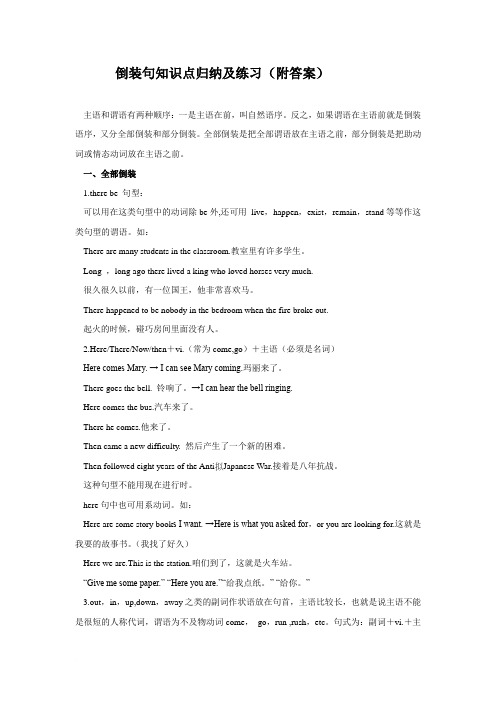
倒装句知识点归纳及练习(附答案)主语和谓语有两种顺序:一是主语在前,叫自然语序。
反之,如果谓语在主语前就是倒装语序,又分全部倒装和部分倒装。
全部倒装是把全部谓语放在主语之前,部分倒装是把助动词或情态动词放在主语之前。
一、全部倒装1.there be 句型:可以用在这类句型中的动词除be外,还可用live,happen,exist,remain,stand等等作这类句型的谓语。
如:There are many students in the classroom.教室里有许多学生。
Long ,long ago there lived a king who loved horses very much.很久很久以前,有一位国王,他非常喜欢马。
There happened to be nobody in the bedroom when the fire broke out.起火的时候,碰巧房间里面没有人。
2.Here/There/Now/then+vi.(常为come,go)+主语(必须是名词)Here comes Mary. → I can see Mary coming.玛丽来了。
There goes the bell. 铃响了。
→I can hear the bell ringing.Here comes the bus.汽车来了。
There he comes.他来了。
Then came a new difficulty. 然后产生了一个新的困难。
Then followed eight years of the Anti Japanese War.接着是八年抗战。
这种句型不能用现在进行时。
here句中也可用系动词。
如:Here are some story book s I want. →Here is what you asked for,or you are looking for.这就是我要的故事书。
英语倒装句讲解和练习附答案
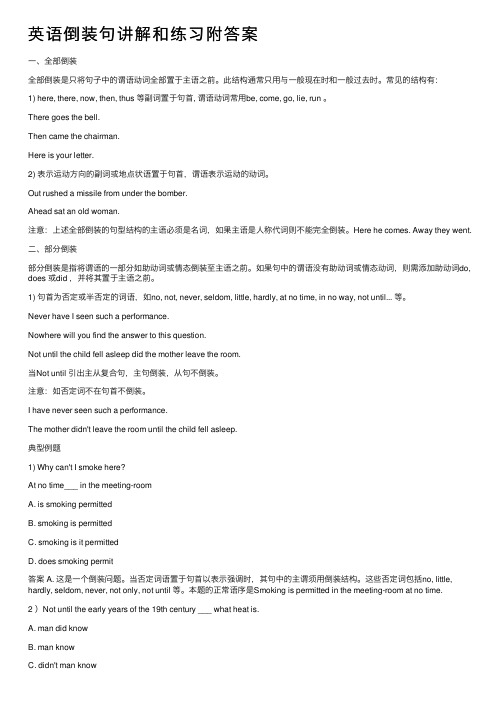
英语倒装句讲解和练习附答案⼀、全部倒装全部倒装是只将句⼦中的谓语动词全部置于主语之前。
此结构通常只⽤与⼀般现在时和⼀般过去时。
常见的结构有:1) here, there, now, then, thus 等副词置于句⾸, 谓语动词常⽤be, come, go, lie, run 。
There goes the bell.Then came the chairman.Here is your letter.2) 表⽰运动⽅向的副词或地点状语置于句⾸,谓语表⽰运动的动词。
Out rushed a missile from under the bomber.Ahead sat an old woman.注意:上述全部倒装的句型结构的主语必须是名词,如果主语是⼈称代词则不能完全倒装。
Here he comes. Away they went.⼆、部分倒装部分倒装是指将谓语的⼀部分如助动词或情态倒装⾄主语之前。
如果句中的谓语没有助动词或情态动词,则需添加助动词do, does 或did ,并将其置于主语之前。
1) 句⾸为否定或半否定的词语,如no, not, never, seldom, little, hardly, at no time, in no way, not until... 等。
Never have I seen such a performance.Nowhere will you find the answer to this question.Not until the child fell asleep did the mother leave the room.当Not until 引出主从复合句,主句倒装,从句不倒装。
注意:如否定词不在句⾸不倒装。
I have never seen such a performance.The mother didn't leave the room until the child fell asleep.典型例题1) Why can't I smoke here?At no time___ in the meeting-roomA. is smoking permittedB. smoking is permittedC. smoking is it permittedD. does smoking permit答案 A. 这是⼀个倒装问题。
- 1、下载文档前请自行甄别文档内容的完整性,平台不提供额外的编辑、内容补充、找答案等附加服务。
- 2、"仅部分预览"的文档,不可在线预览部分如存在完整性等问题,可反馈申请退款(可完整预览的文档不适用该条件!)。
- 3、如文档侵犯您的权益,请联系客服反馈,我们会尽快为您处理(人工客服工作时间:9:00-18:30)。
倒装(Inversion)(教师版含答案)概述: 在英语的句子中,正常的语序是先主语后谓语,当主语和谓语的位置发生调换的时候,就构成了倒装语序。
一是出于语法的要求,多见于疑问句,there be句型中和祝愿句中,二是出于修辞的需要,为了强调,为了描写生动,为衔接上下文或是平衡句子,都可能要用到倒装语序。
分类:倒装语序分为“全部倒装”和“部分倒装”。
在全部倒装的句子中,整个谓语都放在主语的前面;在部分倒装的句子中,只是谓语中的一部分(如助动词,情态动词或系动词be等)放在主语前面,其余部分仍放在主语后面。
下面将常见的倒装情况分述如下:要点:1. 把握好引导倒装的条件2. 注意部分倒装时态的转换和某些特殊句型的时态(如no sooner …than, hardly…when)3. 在需要倒装的复合句中正确地区分发生倒装是在主句还是从句一.全部倒装全部倒装是指将句子中的谓语动词全部置于主语之前。
此结构通常只用于一般现在时与一般过去时。
常见的结构有:1. there be句型, 其中be动词有时可exist, live, stand, lie, seem, appear,remain, happen 等词代替例:There lay a winding brook in front of an old house.翻译:教室有一位有经验的老师和很多可爱的学生。
There is an experienced teacher and many lovely students in the classroom.2.方位词in, out, there, here, inside, outside, up, down, away, off, downstairs, upstairs等以及now, then放在句首时,谓语动词常用be, come, go, lie, run及表运动的动词等,并且句子的主语是名词。
例:Now comes your turn to sweep the floor.Ahead sat an old man.注意:主语是人称代词时,仍用自然语序。
Away they went. (=They went away.)翻译:我昨天买的鸟飞走了.Away flew the bird which I bought yesterday.3.直接引语的一部分或全部放在句首时,有时用倒装。
例:“What’s up, Tom?” asked Mother.“The car is mine,” said Tom.注意:主语是代词时,不倒装。
“The car is mine,” he said.4. 为了平衡句子结构的需要,或为了强调状语(常为介词短语),将状语提前。
例:They arrived at a farmhouse, in front of which sat a small boy.Nearby were the canoes in which they had come to the island.5.主语太长,表语太短,为了平衡句子结构的需要,将表语提前。
例:Gone are the days when we are enslaved.Present at the meeting are ten famous writersAmong the children was an old man.将下列句子变为倒装句:1.Two lakes lie to the east of the city.To the east of the city lie two lakes.2. A boy sat in front of the house.In front of the house sat a boy.3. A table was in the corner.In the corner was a table.二.部分倒装部分倒装是指将谓语的一部分如助动词或情态动词倒装至主语前,如果句中的谓语没有助动词或情态动词,则需添加助动词do, does或did, 并将其置于主语前。
1. 含有否定意义的副词或连词置于句首,如hardly, rarely, seldom, barely, never, not, few, little, neither, nor, not only, hardly…when, in no case, by no means, no sooner…than等。
例:Not a single mistake did he made.Never have I seen such a performance.Hardly had she gone out when a student came to visit her.No sooner had she gone out than a student came to visit her.Not until the child fell asleep did the mother leave the room.Not only did he refuse the gift, but also he severely criticized the sender.Not only you but also she has been to Beijing.注意:1)hardly … when, no sooner… than 主句用过去完成时,从句用一般过去时2)not until 引导从句时,主句倒装,从句不倒装。
3)当not only …but also 连接两个分句时,只在not only 引导的分句倒装,如果连接两个词语则不倒装,但要注意主谓一致。
4)否定词不在句首不倒装。
翻译:1. 任何时候都不允许吸烟。
(at no time) At no time is smoking permitted.2. 直到她在我有困难的时候给我伸出援手我才意识到友谊的重要性。
Not until she gave me a hand when I was in trouble did I realize the importance of friendship.3. 北京不仅是有着悠久历史的中国的首都,而且是一个现代化的城市. Not only is Bejing the capital of China with a long history, but also it is a modern city.2. only + 状语(副词、介词短语、状语从句)放在句首时。
例:Only then did I realize the value of reading aloud every morning.Only by means of talking can we avoid misunderstanding each other.3)Only when the war was over in 1918 was he able to get happily back to work. 注意:如果only 引导从句,则主句倒装,从句不倒装。
翻译:1)只有用这种方法你才能学好英语。
Only in this way can you learn English well.2)只有当你建立起自信心你才会获得成功。
Only when you build up confidence will you achieve your success.3. 用于疑问句。
Shall everything be ready before you arrive? What can I do for you?注意:疑问词做主语或修饰主语时,主谓不颠倒.Who can work it out? How many students have read this book?翻译:1. 要提高我们的英语水平我们该做些什么呢?What should we do to improve our English?2. 你说他正在干什么来着?What do you think he is doing?3. 你知道他是在哪里找到它的吗?Do you know where he found it?4. “so /such +表语/状语+ that从句”结构中的so 或such引导的表语/状语放在句首时。
例:So frightened was she in the darkness that she didn’t dare to move at all.Such a lovely child is he that all of us love him.翻译:小明如此的粗心以致他到了学校才发现自己没带作业本。
So careless is Xiaoming that he found that he didn't take his exercise books when he arrived at school.5.so, as, neither, nor, no more 位于句首,表示前面的情况也适合于另一人或物时。
例:Tom can speak French. So can Jack.If you won't go, neither will I.-- Do you know Jim quarrelled with his brother?-- I don't know, B .A. nor don't I careB. nor do I careC. I don't care neitherD. I don't care also注意:若只是表示对前面所述内容的肯定,确认,主谓不倒装----It's raining hard. ---- So it is (确实如此)。
6. 用于形容词(名词/动词)+ as/though 的让步状语从句中。
例:Proud as they are, they are afraid to see us.Try hard as they would, they could not lift the box.注意:1) 句首名词不能带任何冠词。
2)句首是实义动词,其他助动词放在主语后,如果实义动词有宾语和状语,则随实义动词一起放在主语之前。
翻译:虽然他还是个小孩子,他懂得的要比同龄人要多。
Child as he is, he knows more than his peers/the kids of his age.7.在虚拟语气条件句中,从句谓语动词有were, had, should等词,可将if 省略,把were, had, should 移到主语之前。
